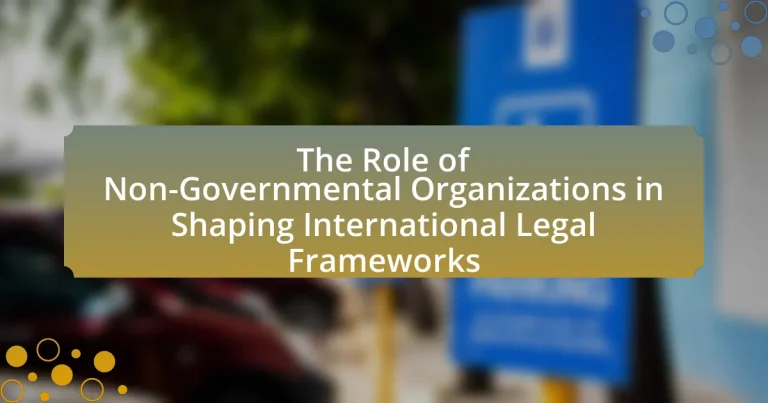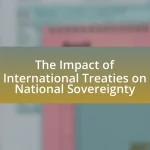Non-Governmental Organizations (NGOs) play a vital role in shaping international legal frameworks by advocating for human rights, environmental protection, and social justice. They influence policy-making through research, lobbying, and public campaigns, contributing to significant legal advancements such as the establishment of the International Criminal Court and various environmental treaties. NGOs utilize methods like coalition building, litigation, and direct engagement with international bodies to represent marginalized voices and promote accountability. Despite facing challenges such as limited access to decision-making processes and political resistance, NGOs continue to adapt and enhance their influence in the evolving landscape of international law.
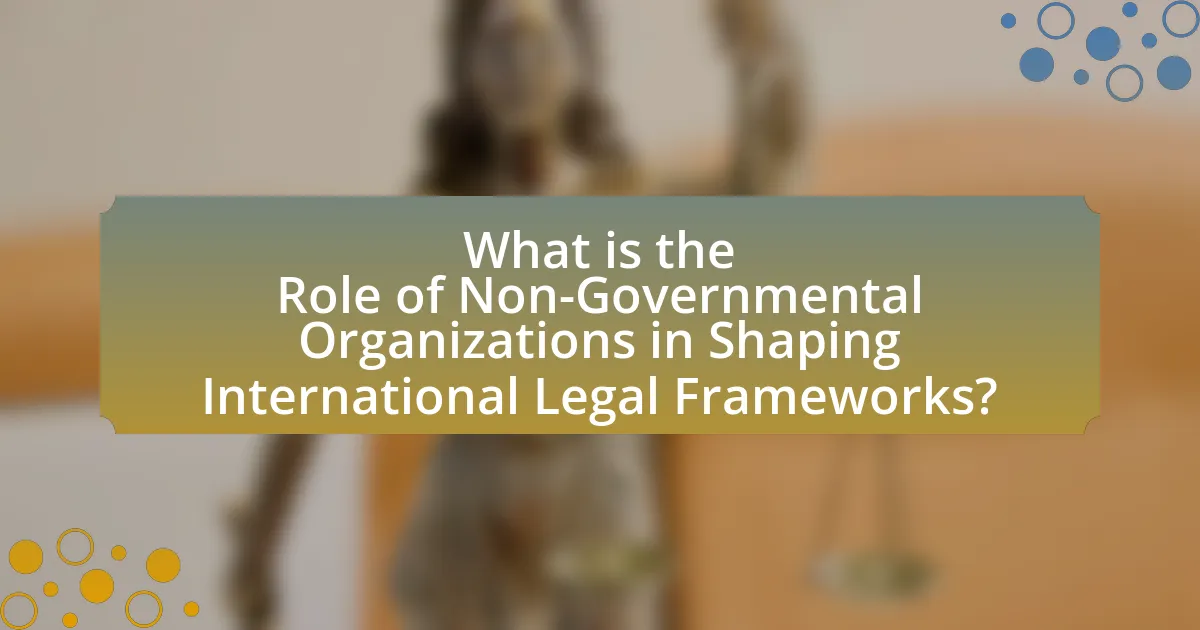
What is the Role of Non-Governmental Organizations in Shaping International Legal Frameworks?
Non-Governmental Organizations (NGOs) play a crucial role in shaping international legal frameworks by advocating for human rights, environmental protection, and social justice. They influence policy-making through research, lobbying, and public campaigns, often providing expertise and data that inform international treaties and agreements. For instance, NGOs like Amnesty International and Human Rights Watch have been instrumental in the development of international human rights laws by documenting abuses and mobilizing public opinion, which pressures governments to adopt legal standards. Additionally, NGOs participate in international forums, such as the United Nations, where they contribute to discussions and negotiations, ensuring that diverse perspectives are considered in the formulation of global legal norms. Their involvement has led to significant legal advancements, such as the establishment of the International Criminal Court and various environmental treaties, demonstrating their impact on international law.
How do Non-Governmental Organizations influence international law?
Non-Governmental Organizations (NGOs) influence international law by advocating for policy changes, raising awareness on global issues, and participating in treaty negotiations. NGOs often provide expert knowledge and research that inform legal frameworks, as seen in the role of organizations like Amnesty International in shaping human rights treaties. Their ability to mobilize public opinion and engage in lobbying efforts can lead to significant shifts in international legal standards, exemplified by the influence of environmental NGOs in the development of climate agreements such as the Paris Agreement. Through these actions, NGOs serve as critical actors in the international legal landscape, driving reforms and promoting accountability.
What methods do NGOs use to advocate for legal changes?
NGOs advocate for legal changes through various methods, including lobbying, public campaigns, research and policy analysis, coalition building, and litigation. Lobbying involves direct interaction with lawmakers to influence legislation, while public campaigns raise awareness and mobilize public support for specific legal reforms. Research and policy analysis provide evidence-based recommendations that inform policymakers, and coalition building allows NGOs to unite with other organizations to amplify their advocacy efforts. Litigation serves as a tool to challenge existing laws or practices in court, thereby prompting legal changes. These methods are supported by numerous case studies demonstrating their effectiveness in influencing legal frameworks globally.
How do NGOs collaborate with international bodies to shape legal frameworks?
NGOs collaborate with international bodies to shape legal frameworks through advocacy, research, and participation in policy-making processes. By providing expert knowledge and grassroots perspectives, NGOs influence the development of international treaties and conventions. For example, organizations like Amnesty International and Human Rights Watch have actively engaged with the United Nations to promote human rights standards, contributing to the drafting of key documents such as the Universal Declaration of Human Rights. Their involvement often includes submitting reports, participating in consultations, and mobilizing public opinion to pressure governments and international organizations to adopt specific legal norms. This collaborative approach ensures that diverse voices are represented in the formation of legal frameworks, enhancing their legitimacy and effectiveness.
Why are Non-Governmental Organizations important in international law?
Non-Governmental Organizations (NGOs) are important in international law because they serve as advocates for human rights, environmental protection, and social justice, influencing legal frameworks and policy decisions. NGOs contribute to the development of international law by providing expertise, raising awareness, and mobilizing public opinion on critical issues. For instance, organizations like Amnesty International and Human Rights Watch have played pivotal roles in shaping human rights treaties and conventions by documenting abuses and lobbying for legal reforms. Their involvement ensures that diverse perspectives are considered in the creation and implementation of international legal standards, thereby enhancing accountability and promoting adherence to the rule of law globally.
What unique perspectives do NGOs bring to legal discussions?
NGOs bring diverse perspectives to legal discussions by representing marginalized voices and advocating for human rights, environmental protection, and social justice. Their grassroots experience allows them to highlight issues often overlooked by traditional legal entities, such as the impact of laws on vulnerable populations. For instance, NGOs like Amnesty International have successfully influenced international human rights treaties by providing firsthand accounts of abuses, thereby shaping legal frameworks to better protect individuals. This unique insight is critical in ensuring that legal discussions are inclusive and reflective of broader societal needs.
How do NGOs represent marginalized voices in international legal processes?
NGOs represent marginalized voices in international legal processes by advocating for their rights, providing legal assistance, and amplifying their concerns in global forums. These organizations often conduct research and gather data to highlight issues faced by marginalized groups, such as indigenous peoples, women, and refugees, ensuring their perspectives are included in policy discussions. For instance, NGOs like Human Rights Watch and Amnesty International submit reports to the United Nations, influencing the development of international treaties and resolutions that address the needs of these communities. Additionally, NGOs facilitate participation of marginalized groups in international negotiations, enabling them to voice their experiences and demands directly to decision-makers. This approach not only raises awareness but also fosters accountability among states and international bodies to uphold human rights standards.
What challenges do Non-Governmental Organizations face in influencing international law?
Non-Governmental Organizations (NGOs) face significant challenges in influencing international law, primarily due to limited access to decision-making processes and the dominance of state actors. NGOs often lack formal authority and resources compared to governments, which can hinder their ability to advocate effectively for legal changes. Additionally, the complexity of international legal frameworks and the need for consensus among diverse nations can obstruct NGO efforts. For instance, during the negotiation of the Paris Agreement, many NGOs struggled to have their voices heard amid the competing interests of powerful countries. Furthermore, NGOs may encounter resistance from states that perceive their influence as a threat to sovereignty, limiting their capacity to shape legal norms.
How do political climates affect NGO operations in legal advocacy?
Political climates significantly influence NGO operations in legal advocacy by determining the regulatory environment, funding availability, and public perception. In authoritarian regimes, NGOs often face restrictive laws that limit their ability to operate, such as stringent registration requirements and censorship, which can hinder their advocacy efforts. For instance, in countries like Russia and Hungary, laws targeting foreign funding have severely impacted NGOs focused on human rights and legal reforms. Conversely, in democratic settings, NGOs typically enjoy greater freedom to advocate for legal changes, access funding, and mobilize public support, as seen in the United States where organizations like the ACLU actively engage in legal advocacy without facing significant governmental interference. Thus, the political climate directly shapes the operational landscape for NGOs, affecting their capacity to influence legal frameworks effectively.
What are the limitations of NGO influence in international legal frameworks?
NGOs face several limitations in influencing international legal frameworks, primarily due to their lack of formal authority and resources compared to state actors. While NGOs can advocate for change and raise awareness on critical issues, they often lack the power to enforce legal obligations or compel states to act. Additionally, many international legal processes prioritize state sovereignty, which can restrict the ability of NGOs to participate meaningfully. For instance, the United Nations operates primarily through member states, limiting direct NGO engagement in decision-making processes. Furthermore, funding constraints can hinder NGOs’ capacity to conduct extensive research or advocacy campaigns, reducing their overall impact on international law.
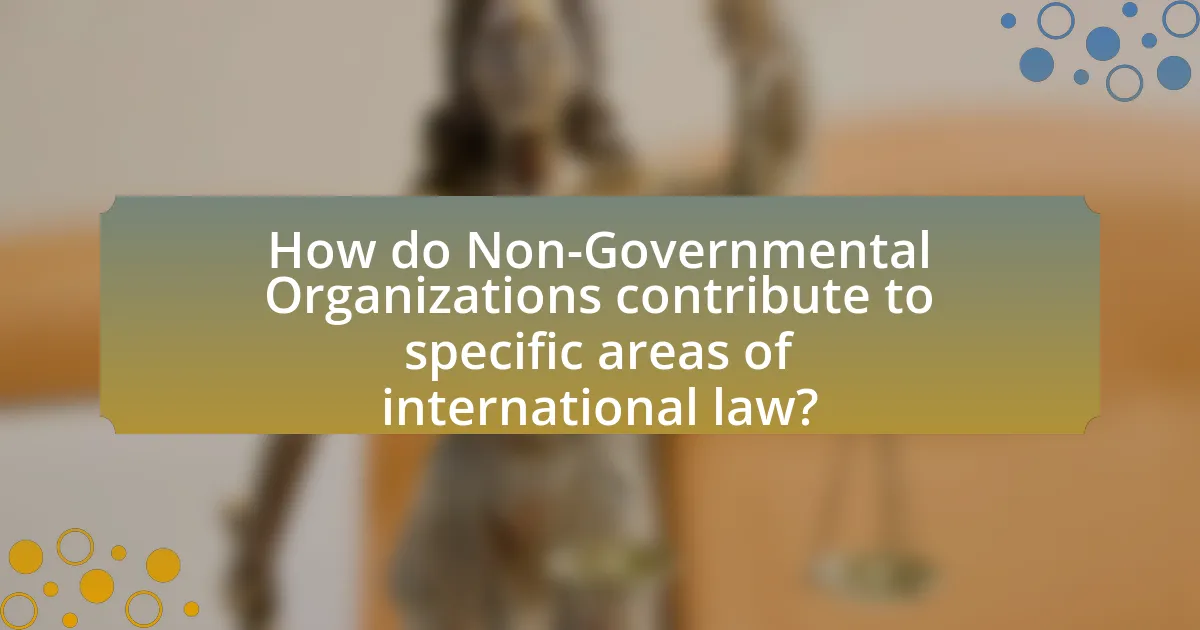
How do Non-Governmental Organizations contribute to specific areas of international law?
Non-Governmental Organizations (NGOs) contribute to specific areas of international law by advocating for human rights, environmental protection, and humanitarian assistance. NGOs like Amnesty International and Human Rights Watch influence international human rights law through monitoring abuses, reporting violations, and lobbying for legal reforms. For instance, the International Criminal Court (ICC) has incorporated evidence and testimonies from NGOs to prosecute war crimes, demonstrating their role in shaping legal accountability. Additionally, organizations such as Greenpeace have played a crucial role in developing international environmental law by raising awareness and pushing for treaties like the Paris Agreement. Their research and advocacy efforts provide essential data and public pressure that lead to the establishment of binding international legal frameworks.
What role do NGOs play in human rights law?
NGOs play a crucial role in human rights law by advocating for the protection and promotion of human rights at local, national, and international levels. They engage in monitoring human rights violations, providing legal assistance to victims, and influencing policy through lobbying and public awareness campaigns. For instance, organizations like Amnesty International and Human Rights Watch document abuses and report findings to international bodies, thereby holding governments accountable. Their efforts have led to significant legal reforms and the establishment of international human rights standards, such as the Universal Declaration of Human Rights, which was influenced by NGO advocacy.
How do NGOs monitor compliance with human rights treaties?
NGOs monitor compliance with human rights treaties through various methods, including reporting, advocacy, and direct engagement with affected communities. They collect data on human rights violations, analyze government actions, and submit shadow reports to treaty bodies, which provide alternative perspectives to official state reports. For instance, organizations like Human Rights Watch and Amnesty International regularly publish detailed reports that highlight discrepancies between state practices and treaty obligations, thereby holding governments accountable. Additionally, NGOs often engage in capacity-building initiatives to empower local communities to document abuses and advocate for their rights, further enhancing their monitoring efforts.
What impact do NGOs have on the development of human rights legislation?
NGOs significantly influence the development of human rights legislation by advocating for policy changes, raising awareness, and providing expertise. They often serve as watchdogs, documenting human rights abuses and mobilizing public opinion, which pressures governments to enact or amend laws. For instance, organizations like Amnesty International and Human Rights Watch have played pivotal roles in the establishment of international treaties such as the Convention on the Rights of the Child, highlighting the need for legal protections. Their research and reports often inform legislative processes, ensuring that human rights considerations are integrated into national and international law.
How do NGOs influence environmental law?
NGOs influence environmental law by advocating for policy changes, raising public awareness, and participating in legal processes. They often conduct research and provide expert testimony that informs lawmakers and the public about environmental issues. For instance, organizations like Greenpeace and the World Wildlife Fund have successfully lobbied for stronger regulations on pollution and biodiversity protection, leading to the adoption of international agreements such as the Paris Agreement. Their ability to mobilize public opinion and engage in litigation further amplifies their impact, as seen in cases where NGOs have challenged government decisions in court, resulting in more stringent environmental protections.
What strategies do NGOs employ to promote environmental protection in legal frameworks?
NGOs employ various strategies to promote environmental protection within legal frameworks, including advocacy, litigation, and policy development. Advocacy involves raising public awareness and influencing policymakers to adopt environmentally friendly laws, as seen in campaigns led by organizations like Greenpeace, which successfully pushed for the adoption of the Paris Agreement. Litigation is another critical strategy, where NGOs file lawsuits to enforce existing environmental laws or challenge harmful projects, exemplified by the Sierra Club’s legal actions against coal-fired power plants in the United States. Additionally, NGOs contribute to policy development by providing expertise and research to inform legislation, such as the World Wildlife Fund’s involvement in the development of the Convention on Biological Diversity. These strategies collectively enhance the legal mechanisms for environmental protection.
How do NGOs engage with international environmental agreements?
NGOs engage with international environmental agreements by participating in negotiations, advocating for stronger environmental protections, and monitoring compliance. They often serve as key stakeholders in the negotiation process, providing expertise and representing the interests of affected communities. For instance, during the 2015 Paris Agreement negotiations, organizations like Greenpeace and the World Wildlife Fund played crucial roles in lobbying for ambitious climate targets and ensuring that the voices of vulnerable populations were heard. Additionally, NGOs frequently conduct research and publish reports that highlight the effectiveness of these agreements, thereby influencing public opinion and policy decisions. Their involvement is essential for holding governments accountable and ensuring that international commitments are met.
What is the role of NGOs in humanitarian law?
Non-Governmental Organizations (NGOs) play a crucial role in humanitarian law by advocating for the protection of human rights and the enforcement of international legal standards during conflicts. They engage in monitoring compliance with humanitarian law, providing legal assistance, and raising awareness about violations. For instance, organizations like the International Committee of the Red Cross (ICRC) actively promote adherence to the Geneva Conventions, which govern the conduct of armed conflict and protect those not participating in hostilities. Additionally, NGOs often document abuses and provide evidence to international bodies, thereby contributing to accountability and justice for victims. Their involvement is essential in shaping policies and practices that uphold humanitarian principles globally.
How do NGOs provide assistance in conflict zones under international humanitarian law?
NGOs provide assistance in conflict zones under international humanitarian law by delivering essential services such as medical care, food distribution, and shelter to affected populations. These organizations operate based on the principles of humanity, neutrality, impartiality, and independence, which are fundamental to international humanitarian law. For instance, the International Committee of the Red Cross (ICRC) plays a crucial role in ensuring compliance with humanitarian standards and facilitating access to vulnerable groups in conflict areas. Additionally, NGOs often engage in advocacy efforts to promote adherence to international humanitarian law by all parties involved in the conflict, thereby reinforcing legal protections for civilians and aid workers.
What advocacy efforts do NGOs undertake to strengthen humanitarian protections?
NGOs undertake various advocacy efforts to strengthen humanitarian protections, including lobbying for policy changes, raising public awareness, and engaging in legal advocacy. These organizations actively influence governments and international bodies to adopt and implement laws that enhance the safety and rights of vulnerable populations. For instance, NGOs like Human Rights Watch and Amnesty International have successfully campaigned for the adoption of international treaties, such as the Convention on the Rights of Persons with Disabilities, which aims to protect the rights of individuals with disabilities in humanitarian contexts. Additionally, NGOs often conduct research and publish reports that highlight violations of humanitarian law, thereby holding violators accountable and pushing for reforms. These efforts are crucial in shaping international legal frameworks that prioritize humanitarian protections.
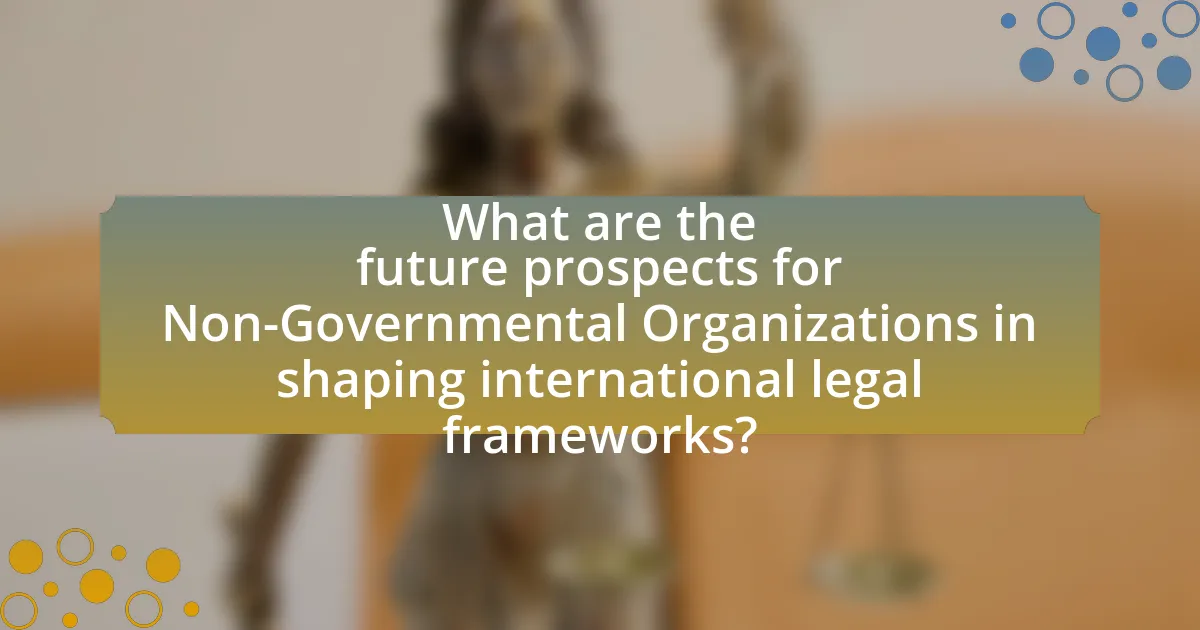
What are the future prospects for Non-Governmental Organizations in shaping international legal frameworks?
Non-Governmental Organizations (NGOs) are poised to play an increasingly influential role in shaping international legal frameworks in the future. This is evidenced by their growing participation in global governance processes, advocacy for human rights, and environmental protection, which have led to significant legal reforms. For instance, the involvement of NGOs in the United Nations Framework Convention on Climate Change has been pivotal in advancing international climate agreements, such as the Paris Agreement. Furthermore, the rise of digital communication has enhanced NGOs’ ability to mobilize public opinion and influence policymakers, thereby reinforcing their capacity to impact international law. As global challenges become more complex, the collaborative efforts between NGOs and intergovernmental organizations are likely to expand, further embedding NGOs in the development of international legal standards.
How can NGOs adapt to changing global dynamics in legal advocacy?
NGOs can adapt to changing global dynamics in legal advocacy by leveraging technology, enhancing collaboration, and focusing on data-driven strategies. The integration of digital tools allows NGOs to reach broader audiences, mobilize support quickly, and disseminate information effectively. For instance, the use of social media platforms has enabled organizations to engage with stakeholders in real-time, facilitating rapid responses to legal challenges.
Additionally, forming strategic partnerships with other NGOs, governmental bodies, and private sector entities enhances resource sharing and amplifies advocacy efforts. Collaborative initiatives, such as the Global Legal Empowerment Network, demonstrate how NGOs can unite to address complex legal issues on a larger scale.
Focusing on data-driven strategies, including the collection and analysis of legal data, helps NGOs identify trends and inform their advocacy efforts. Research from the World Justice Project indicates that data-driven approaches can significantly improve the effectiveness of legal advocacy by providing evidence-based insights into legal needs and barriers faced by communities.
What emerging issues are NGOs likely to address in international law?
NGOs are likely to address emerging issues in international law such as climate change, human rights violations, and digital privacy. These organizations play a crucial role in advocating for legal frameworks that respond to the urgent challenges posed by environmental degradation, as evidenced by the increasing number of climate-related lawsuits and treaties aimed at reducing carbon emissions. Additionally, NGOs are pivotal in highlighting human rights abuses, particularly in conflict zones, and pushing for accountability through international legal mechanisms. The rise of technology has also prompted NGOs to focus on digital privacy and data protection, advocating for laws that safeguard individual rights in the digital age. These issues reflect the evolving landscape of international law, where NGOs are instrumental in shaping responses to contemporary global challenges.
How can technology enhance NGO efforts in legal advocacy?
Technology can enhance NGO efforts in legal advocacy by improving access to information, facilitating communication, and enabling data analysis. For instance, digital platforms allow NGOs to disseminate legal resources and updates to a broader audience, increasing awareness of legal rights and issues. Additionally, tools like social media and online collaboration software enable NGOs to coordinate campaigns and mobilize supporters more effectively. Data analytics can help NGOs identify trends and patterns in legal cases, allowing for targeted advocacy strategies. According to a report by the International NGO Training and Research Centre, the use of technology in advocacy has led to increased engagement and more effective campaigns, demonstrating its significant impact on legal advocacy efforts.
What best practices can NGOs adopt to improve their influence on international law?
NGOs can improve their influence on international law by engaging in strategic advocacy, building coalitions, and utilizing data-driven research. Strategic advocacy involves identifying key legal frameworks and lobbying for specific changes, which has been shown to effectively shape policy outcomes, as evidenced by the successful campaigns of organizations like Human Rights Watch in influencing the United Nations. Building coalitions with other NGOs and stakeholders amplifies their voice and resources, allowing for a more unified approach to pressing legal issues, as seen in the collaboration of various environmental NGOs during the Paris Agreement negotiations. Utilizing data-driven research provides credible evidence to support their positions, enhancing their legitimacy and persuasive power in legal discussions, as demonstrated by the extensive reports produced by the World Wildlife Fund that have influenced international conservation laws.
How can NGOs build effective coalitions for legal advocacy?
NGOs can build effective coalitions for legal advocacy by establishing clear objectives, fostering trust among members, and leveraging diverse expertise. Clear objectives ensure that all coalition members are aligned on goals, which enhances focus and effectiveness. Trust among members is crucial for collaboration; this can be cultivated through open communication and shared decision-making processes. Additionally, leveraging diverse expertise allows coalitions to address complex legal issues more comprehensively, drawing on the strengths of various organizations. For instance, coalitions like the Global Network for the Right to Food have successfully united different NGOs to advocate for legal reforms by combining their unique skills and resources, demonstrating the effectiveness of such collaborative efforts.
What strategies can NGOs use to enhance their credibility and impact?
NGOs can enhance their credibility and impact by implementing transparent governance practices, engaging in evidence-based advocacy, and fostering partnerships with stakeholders. Transparent governance practices, such as regular financial reporting and accountability measures, build trust with donors and beneficiaries, as demonstrated by the 2019 Global Accountability Report, which found that organizations with high transparency ratings received 30% more funding. Evidence-based advocacy, which involves using data and research to support claims, increases the effectiveness of campaigns; for instance, the World Wildlife Fund’s use of scientific studies has led to significant policy changes in environmental legislation. Additionally, fostering partnerships with governments, other NGOs, and community organizations amplifies their reach and effectiveness, as seen in the collaboration between Amnesty International and local groups that resulted in successful human rights initiatives.
